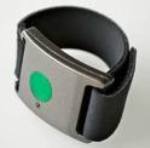Nov 17 2010
Affectiva, a firm that develops technologies to assist people suffering from autism spectrum disorders, has announced at the Future Forward Executive Forum the launch of a beta form of its biosensor named Q Sensor.
The Q Sensor is a biosensor, which is wearable and functions wirelessly, computes emotional stimulation by calculating physiological reactions such as galvanic skin response (GSR) or skin conductance, temperature and motion. It measures information related to emotion by offering an objective biomarker. Quantifying emotion is otherwise not easy or even not possible.
 Affectiva Q Sensor
Affectiva Q Sensor
The Q Sensor assists persons to convey their emotions by surpassing their major obstacles. It computes the participants’ actual emotional signals and not their self-reported responses as in the case of conventional feedback form and focus groups. Conventional GSR equipments can be used only in the laboratories, whereas Q Sensor can be used in natural outside settings as it functions wirelessly and has a wristwatch-like shape.
Affectiva has released the biosensor with downloadable software for envisaging and studying data. The company plans to launch a cloud-computing-based edition of the software next year to assist people suffering from post-traumatic stress disorder (PTSD) or autism to share information and opinion secretly. The biosensor is currently used for market and clinical research.
Stanford School of Medicine’s professor of psychiatry and behavioral science, Dr. Walton Roth commented that the biosensor is a successful and superior product either as a recorder or as a transducer than its competitor. He is employing the biosensor in a five-year investigation on how breathing drills assist people suffering from PTSD.
The Ivymount School in Rockville’s Model Asperger Program’s director Monica Alder Werner, stated that the biosensor could assist kids by detecting the problems at the earliest, which in turn would help them to develop good problem-solving skills. She employs the sensor to assist kids to elevate their behavior by understanding the antecedents in a better way and assist teachers to develop self-regulation strategies for their students by using the hard data.